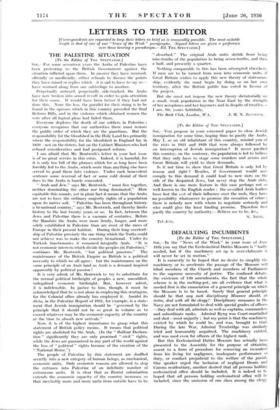THE PALESTINE SITUATION
LETTERS TO THE EDITOR
[Correspondents are requested to keep their letters as brief as is reasonably possible. The most suitable length is that of one of our "News of the Week" paragraphs. Signed letters are given a preference over those bearing a pseudonym.—Ed. THE SPECTATOR.] [To the Editor of THE SPECTATOR.]
Sin,—For some seventeen years the Arabs of Palestine have been protesting to the British Government against the situation inflicted upon them. In answer they have received, officially or unofficially, either refusals to discuss the points they have raised or replies which- -it is sad to have to say so— have wormed along from one subterfuge to another.
Perpetually unheard, perpetually side-tracked, the Arabs have now broken into armed revolt in order to gain attention for their cause. It would have been better if they had not done this. None the less, the parallel for their rising is to be found in the uproars which in this country preceded the final Reform Bills, and in the violence which obtained women the vote after all logical pleas had failed them.
Everyone deplores the death of our soldiers in Palestine ; everyone recognises that our authorities there must restore the public order of which they arc the guardians. But the responsibility for the bloodshed in the Holy Land lies primarily where the responsibility for the bloodshed in England lay in 1839—not on the rioters, but on the Cabinet Ministers who had refused consideration and had postponed reform.
I am afraid that Mr. Bentwich's letter in your last issue is of no great service in this crisis. Indeed, it is harmful, for it is only too full of the phrases which for so long have been forcibly fed to the Arabs, which more than anything else have served to goad them into violence. Under each benevolent sentence some reversal of fact or some cold denial of their dues to the Arabs is barely concealed.
" Arab and Jew," says Mr. Bentwich, " must live together, neither dominating the other nor being dominated." How equitable this sounds, yet in plain fact it means that the Arabs are not to have the ordinary majority rights of a population upon its native soil. " Palestine has been throughout history a bi-national country," says Mr. Bentwich, and thereby limits history to the last twenty years or so. In fact, between the Jews and Palestine there is a vacuum of centuries. Before the Mandate the Arabs were more firmly, longer, and more solely established in Palestine than are most of the races of Europe in their present habitat. During their long overlord- ship of Palestine precisely the one thing which the Turks could not .achieve was to make the country bi-national. Under its Turkish functionaries it remained integrally Arab. " It is not economic interests which divide the peoples (in Palestine)," continues Mr. Bentwich, " but political passions." The maintenance of the British Empire as British is a political necessity to which we all agree; but the maintenance on the same principle of an Arab land as Arab is a demand inspired apparently by political passion !
It is very adroit of Mr. Bentwich to try to substitute for the normal political birthright of peoples a new, uncodified, Unlegalised economic birthright. But, however adroit, it is indefensible. In justice to him, though, it must be acknowledged that he is not alone in employing this stratagem, for the Colonial office already has employed it. Amidst its dicta, in the Palestine Report of 1931, for example, is a state- ment that Jewish immigration should be " governed by the principle that it should not be so great in volume as to exceed whatever may be the economic capacity of the country at the time to absorb new arrivals."
Now, it is of the highest importance to grasp what this statement of British policy means. It means that political rights are abolished for the Arab. (In the " Balfour Declara- tion " significantly they are only promised " civil " rights, while the Jews arc guaranteed in any part of the world against the loss of " political " rights because of the creation of the " National Home.") The people of Palestine by this statement are shuffled secretly into a new category of human beings, as mechanical, economic units. Only economic reasons are allowed to stop the entrance into Palestine of an indefinite number of extraneous units. It is clear that as Zionist colonisation extends the economic capacity of the country increases, so that inevitably more and more units from outside have to be " absorbed." The original Arab units shrink from being nine-tenths of the population to being seven-tenths, and then a half, and presently a quarter.
Nothing comparable to this has been attempted elsewhere. If men are to be turned from men into economic units, if Great Britain wishes to apply this new theory of statesman- ship, evidently she must begin by doing so on her own territory, after the British public has voted in favour of the project.
But she must not impose the new theory dictatorially on a small, weak population in the Near East by the strength of her aeroplanes and her bayonets and in despite of treaties.— I am, Sir, yours faithfully,
The Bath Club, London, W.1. J. M. N. JEFIRIF.S.










































 Previous page
Previous page